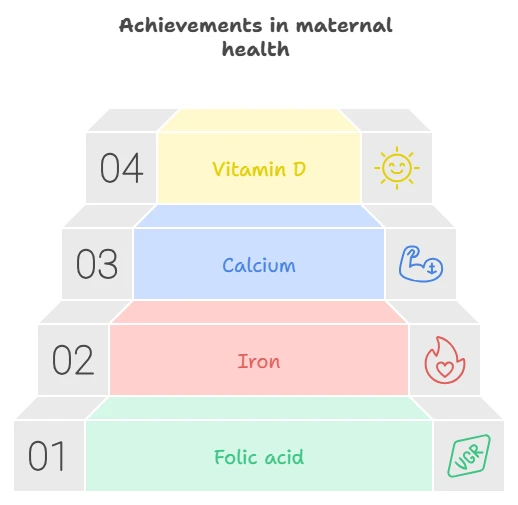

Pregnancy is a special period in a woman’s life, which requires increased attention to nutrition.
A proper diet contributes to the health of the expectant mother and ensures optimal fetal development.
In this article, we will review current nutritional recommendations during pregnancy based on the latest research.

The importance of good nutrition during pregnancy
A healthy diet plays a key role in preventing various pregnancy complications such as anemia, gestational diabetes and pre-eclampsia.
In addition, adequate nutrient intake contributes to the proper development of the organs and systems of the fetus.

Essential nutrients and their role
Protein
Protein is essential for tissue growth and repair. During pregnancy, the protein requirement increases by 25 grams per day.
Carbohydrates
Carbohydrates are the main source of energy. Complex carbohydrates such as whole grain products and vegetables should be preferred.
Fats
Unsaturated fatty acids, especially omega-3, are important for a child’s brain and vision development.

Vitamins and minerals
Folic acid
Reduces the risk of neural tube defects in the fetus. The recommended dose is 400-600 mcg per day.
Iron
Prevents the development of anemia in the mother and fetus. The daily allowance is 27 mg.
Calcium
Important for bone formation. 1000 mg per day is recommended.
Vitamin D
Promotes calcium absorption and supports the immune system.

Table 1. Recommended daily doses of key nutrients
| Nutrient | Recommended dose |
|---|---|
| Protein | 75-100 grams |
| Folic acid | 400-600 mcg |
| Iron | 27 mg. |
| Calcium | 1000 mg. |
| Vitamin D | 600 IU |

Nutritional recommendations for different trimesters
First trimester
- Increase folic acid intake.
- Pay attention to sources of B vitamins.
- Avoid toxic substances and allergens.
Second trimester
- Increase protein and iron intake.
- Add foods rich in calcium and vitamin D to the diet.
Third trimester
- Control calorie intake to prevent overweight.
- Increase intake of omega-3 fatty acids for fetal brain development.
Foods to avoid
- Raw or undercooked foods: meat, fish, eggs.
- Fish with high mercury content: shark, king mackerel.
- Unpasteurized dairy products: risk of Listeria infection.
- Alcohol and caffeine: may adversely affect fetal development.
Table 2. Examples of foods to avoid
| Product | Reason |
|---|---|
| Raw seafood | Risk of infection |
| Unpasteurized milk | The possibility of listeriosis |
| Alcohol | Risk of birth defects |
| Caffeine in large quantities | Risk of low birth weight |

Current research and its findings
Current research emphasizes the importance of the gut microbiome during pregnancy.
A healthy maternal microbiome influences the immune system, metabolic and mental health of both the mother and the fetus.
Consumption of probiotics and prebiotics found in fermented foods and dietary fiber helps to strengthen immunity, improve digestion and reduce the risk of allergies in the baby.

Vitamin D plays a key role in preventing pregnancy complications such as pre-eclampsia and gestational diabetes.
It supports the immune system and promotes proper fetal development.
Vitamin D deficiency can increase the risk of these complications, so it is important to maintain vitamin D levels through diet (fatty fish, egg yolks, fortified foods), moderate sun exposure and, if necessary, supplementation as prescribed by your doctor.
A comprehensive approach that integrates knowledge of the microbiome and vitamin D into the diet is key to maternal and child health.
A balanced diet, regular medical check-ups and an individualized approach will help to create optimal conditions for a healthy pregnancy and baby’s development.

Practical tips
- Fractional eating : eat small meals 5-6 times a day.
- Hydration: drink at least 8 glasses of water a day.
- Consult a specialist : consult a doctor before introducing new products or supplements into your diet.
Conclusion
Proper nutrition during pregnancy is the key to the health of mother and child.
By following modern recommendations and listening to your body, you will create optimal conditions for the favorable course of pregnancy and the development of the baby.



